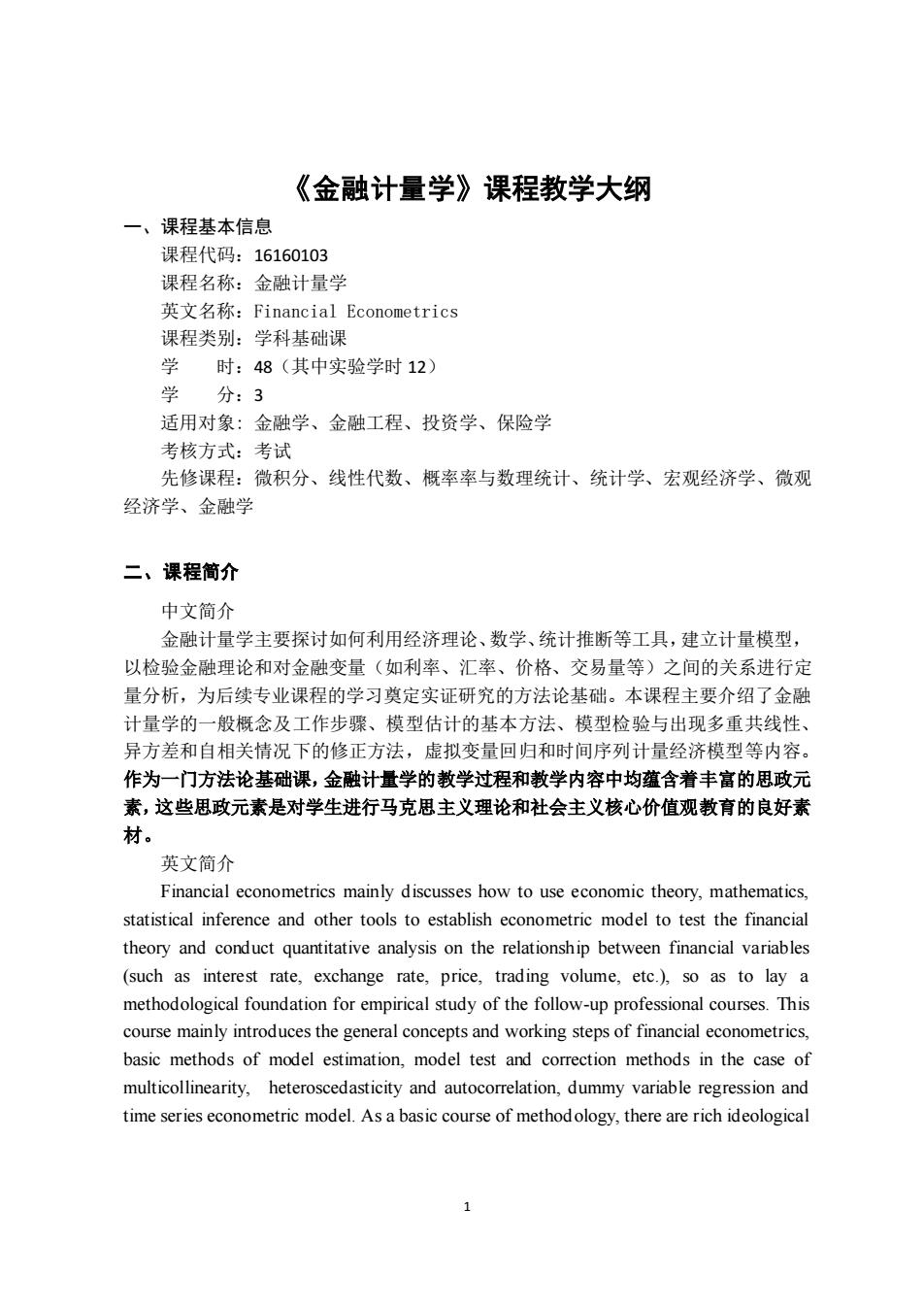正在加载图片...

《金融计量学》课程教学大纲 一、课程基本信息 课程代码:16160103 课程名称:金融计量学 英文名称:Financial Econometrics 课程类别:学科基础课 学时:48(其中实验学时12) 学 分:3 适用对象:金融学、金融工程、投资学、保险学 考核方式:考试 先修课程:微积分、线性代数、概率率与数理统计、统计学、宏观经济学、微观 经济学、金融学 二、课程简介 中文简介 金融计量学主要探讨如何利用经济理论、数学、统计推断等工具,建立计量模型, 以检验金融理论和对金融变量(如利率、汇率、价格、交易量等)之间的关系进行定 量分析,为后续专业课程的学习奠定实证研究的方法论基础。本课程主要介绍了金融 计量学的一般概今及工作步聚、模型估计的基本方法、模型检验与出现多重共线性、 异方差和自相关情况下的修正方法,虚拟变量回归和时间序列计量经济模型等内容。 作为一门方法论基础课,金融计量学的教学过程和教学内容中均蕴含着丰富的思政元 素,这些思政元素是对学生进行马克思主义理论和社会主义核心价值观教育的良好素 材。 英文简介 Financial econometrics mainly discusses how to use economic theory,mathematics. statistical inference and other tools to establish econometric model to test the financial theory and conduct quantitative analysis on the relationship between financial variables (such as interest rate,exchange rate,price,trading volume,etc.),so as to lay a methodological foundation for empirical study of the follow-up professional courses.This course mainly introduces the general concepts and working steps of financial econometrics, basic methods of model estimation,model test and correction methods in the case of multicollinearity,heteroscedasticity and autocorrelation,dummy variable regression and time series econometric model.Asa basic course of methodology,there are rich ideological1 《金融计量学》课程教学大纲 一、课程基本信息 课程代码:16160103 课程名称:金融计量学 英文名称:Financial Econometrics 课程类别:学科基础课 学 时:48(其中实验学时 12) 学 分:3 适用对象: 金融学、金融工程、投资学、保险学 考核方式:考试 先修课程:微积分、线性代数、概率率与数理统计、统计学、宏观经济学、微观 经济学、金融学 二、课程简介 中文简介 金融计量学主要探讨如何利用经济理论、数学、统计推断等工具,建立计量模型, 以检验金融理论和对金融变量(如利率、汇率、价格、交易量等)之间的关系进行定 量分析,为后续专业课程的学习奠定实证研究的方法论基础。本课程主要介绍了金融 计量学的一般概念及工作步骤、模型估计的基本方法、模型检验与出现多重共线性、 异方差和自相关情况下的修正方法,虚拟变量回归和时间序列计量经济模型等内容。 作为一门方法论基础课,金融计量学的教学过程和教学内容中均蕴含着丰富的思政元 素,这些思政元素是对学生进行马克思主义理论和社会主义核心价值观教育的良好素 材。 英文简介 Financial econometrics mainly discusses how to use economic theory, mathematics, statistical inference and other tools to establish econometric model to test the financial theory and conduct quantitative analysis on the relationship between financial variables (such as interest rate, exchange rate, price, trading volume, etc.), so as to lay a methodological foundation for empirical study of the follow-up professional courses. This course mainly introduces the general concepts and working steps of financial econometrics, basic methods of model estimation, model test and correction methods in the case of multicollinearity, heteroscedasticity and autocorrelation, dummy variable regression and time series econometric model. As a basic course of methodology, there are rich ideological